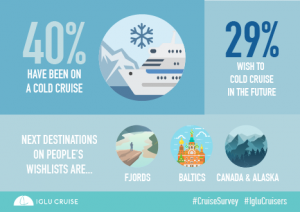How the cruise industry is evolving

Whether they choose to embrace it or fight it, the cruising industry’s stereotype as a holiday for the newly-wed, over-fed and nearly-dead is well established. No matter what cruise lines and companies do to fight this stigma, from hosting hip music festivals on their decks to cuddly Disney mascots, it seems it’s going to take quite a bit of rocking the boat to cast the old views overboard. As a result, extensive research has been done on this topic from some of the industry’s leading players.
In their 2018 Travel Trends Report, The Association of British Travel Agents (ABTA ) found a few interesting key trends. Firstly, responsible tourism and awareness to the environmental impact had increased. Upon inspection, this was probably as a result of David Attenborough’s Blue Planet II series. Secondly, a desire for more alternative destinations is on the up, such as Argentina, Alaska and Antarctica. To an extent, this can be linked to the initial key trend as people become aware of typical destinations, such as the Caribbean, becoming too ‘touristy’ and locals even protesting as a result of the impact, as in Barcelona. In contrast to this, new locations are opening their arms to newcomers visiting- especially those aimed at counter culture and younger people in alternative city breaks. Meanwhile, 14% of UK holidaymakers intend to cruise while 10% are millennials. This has led to the Wi-Fi boom and internet arms race aboard competing lines while river cruises are growing as a result of this millennial market, predominantly in Europe. More exotic destinations such as South America and Alaska are opening up too but most people still like to depart from the UK with many liking cruise and stay packages due to the ease and reliability, as well as value for money. All-inclusive cruises are also on the up with Brexit’s uncertainty and pound fluctuations taking this out of the equation while trips to the US are down 3% due to the fall of the pound against the dollar.
At the same time Iglu, the UK’s market leader online travel agency, conducted their own customer survey in late 2017. Of the 9,000 people who took part, they found a majority were in the typical middle-age to senior category. However, they did see a marked rise in the number of people wishing to go to one of the more exotic destinations with 40% having been on a ‘cold cruise’ to either Alaska, the Norwegian Fjords or Iceland, while a further 29% wished to. Contrary to ABTA, only a tiny proportion said they were interested in river cruising, however, in line with ABTA, an eye-watering 61% confirmed Wi-Fi was the greatest cruising industry innovation. When one considers how much painstaking and expensive effort is made by the lines in terms of, technology , entertainment and facilities, such as bumper cars, West End shows and waterslides, it really is quite something that Wi-Fi comes top of the list.
As can be seen from these two recent findings, it is definite that the cruising industry is changing to be ready and meet the needs of its younger audience of the future- it may simply be that that audience is not ready for cruising yet. However, in spite of what developments are made in future, it seems there will always be a place for classic holiday packages in the heart of the British holidaymaker, and with that the nostalgic elements of a cruise.

